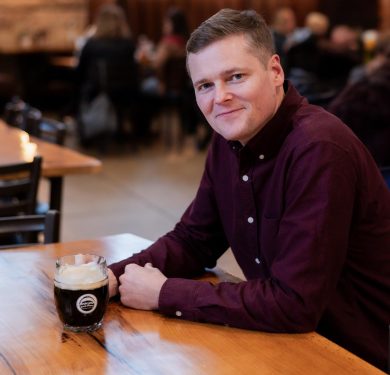“This is real. This is not just an idea anymore. We’re going to do it.”
I’m a plant scientist and work in the field of agriculture. And I’m the founder of a biotech startup. All three of those descriptors are good places to start.
I grew up on a farm in central Indiana, and there was a time when I thought tractors were cool and wanted to be a farmer. Then in the ’90s, computers became more prominent, and I wanted to do computer programming, but I think it was my grandmother who said, “No, go do something where you can make some money.” That was before Bill Gates was the richest man in the world.
I interned with Dow AgroSciences [now Corteva AgriScience] as an undergrad at Purdue, which was amazing. I saw how far you can take an idea when you get teams of people around it. I got my Ph.D. from the University of Edinburgh and was a postdoc at the University of Georgia and Purdue. My dream wasn’t to stay in academia forever, but when I was trying to get into the workforce, it was during the Great Recession. Everybody was making layoffs. Scientists were being consolidated and whole teams were being let go.
The standard practice then was if you invented something really fantastic, the company paid you a dollar for rights to your patent and then they went off and made a bunch of money from it, and you got the opportunity to keep your job for a little while longer. That was foundational for me — to recognize that whether I was at an established company or working for myself, there was no job security.
During this time, I started having conversations with my brother about the family farm and how they had started to use fungicides to try to control for disease problems. They bought the products in the middle of winter for the entire farm. It was kind of crazy to me why they would try to solve this problem before seeds were even in the ground. Then I learned you can’t heal a plant in the same way you can heal an animal. You have to be preventive. Using fungicides and insecticides made sense, but I thought, There’s surely got to be a better way. So I put together a couple of pieces of background information I’d learned during my academic career, and that became the foundation of what has become Insignum.
Our most significant milestone was the day I started the company. I was in my home office and clicked the button to file the paperwork with the state and I was like, This is real. This is not just an idea anymore. We’re going to do it. That was in 2019. I was teaching at Ivy Tech through those days even after we secured some funding and got the lab started.
We’ve had other great milestones. We recently had our patent granted and got USDA regulatory approval for our first gene. We are also testing with Becks Hybrids, one of the largest seed companies in the country. On the horizon, we’ll be getting our first product into commercialization and then building a portfolio of products. Our technology will make agriculture more sustainable, not only in the US but around the world. The opportunities to better our world are right in front of us. We just need to reach out and grab them. That’s our mission.
What Insignum needs now is to grow our team bring this to market and develop more products. That takes investment. Elevate has fueled us in the most important way: They funded us. I’m very grateful for what they are doing and how they go about supporting and building the ecosystem for investors and founders. I’m very, very happy that Elevate is a continued partner — not just once, not just early, but a continual partner.
